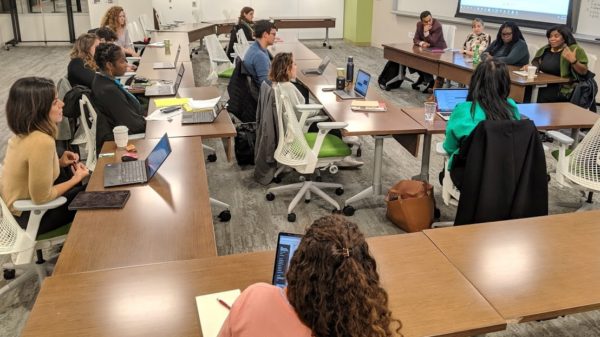Grand Finale: 4 Entrepreneurs’ Lessons on Law, as Summed-Up by Students

Our talk with four entrepreneurial leaders: Amelia Adams, Allison (Abrams) Yee, Asheen Phansey, and Bianca Jordan (all alumni, and/or otherwise associated with Babson) provided a great wrap-up to our course on legal astuteness with regard to business formation and strategy, IP, contracts, torts, and HR.
Their profiles, full titles, and connections to Babson are as follows:
Amelia Adams, President at Adams Advisors LLC (Babson undergrad alumna)
Allison (Abrams) Yee, Founder & CEO at UpNext | Retail Reimagined (Babson MBA alumna)
Bianca Jordan, founder of Brazen Legal (CWEL Mentor at Babson)
Below are highlights of take-aways from our conversation with them, based on student reflective summaries.
On business formation and strategy:
- Like our past speakers, Amelia exemplified how awareness of loopholes or differences between the states can help an entrepreneur to circumvent inconveniences and create and protect more value.
- Amelia specifically mentioned she incorporated in Delaware not only because it is easier, but also because New York State requires advertisement in newspapers for her type of service.
On IP:
- Several students loved Bianca’s comment: “I can give you the recipe, but it won’t taste the same, because I’m the magic.” This reminded students of what prior speakers – as well as entrepreneurs whom they interviewed privately – said about IP (although the precise lesson may depend on the context and industry).
- In some contexts, “IP can be more about how a service is executed than the steps.”
- In other contexts: “you can disclose the cake (or patent it) while keeping the recipe secret (using the concept of trade secrets).”
- Some noted how interesting it is that, even when there is no product, but rather a service being rendered, IP is still an issue to consider [it was a happy coincidence that all four guest speakers on the last day have businesses based on providing a service].
On contracts:
- Going into detail (and specifically getting to know your clients and possible contingencies and to use contractual language to control for risks that something may not go according to plan) was noted by several students.
- Several of our guests from this as well as prior sessions were cited as sharing memorable experiences that reinforced this point – some even mentioned regret for not ending a client relationship sooner.
On diligence when attempting to enact change:
- Innovation can happen within an established organization. However, being “intra-preneurial” is a quality that requires the utmost patience, diligence, and perseverance (especially in a large organization).
- Familiarity with rules can enable, while lack of familiarity with law and structures (formal and informal) can greatly hinder the pursuit of constructive change.
On limiting liability and risk while also capturing-and-protecting value with legal astuteness:
- Students noted that contracts in general and specifically NDA’s and confidentiality agreements with clients and employees can be used to mitigate risk.
- Additionally, some noted the comments of our guests that one of their most valuable “lessons learned” was to make sure contractual terms are revisited and updated when they are renewed.
- These four guests (as well as our previous conversations with prior guests), were referenced as further supporting George Siedel’s thesis that contracts (and law more generally) can help to secure competitive advantage. In other words, Siedel’s book frames legal astuteness and a proactive approach to law as closely related to both ethics and strategy, which was one of the intended themes of this new course on law for entrepreneurial leaders.
There were more bits of wisdom that related to the specific contexts of these businesses:
- Students had specific questions about the process of engaging in contracts to advocate on behalf of private sector actors in the arena of public policy (Amelia’s business).
- Students were generally interested in how IP and competitive advantage can be protected, and what do when there are disagreements with difficult clients, in the context of professional services (such as Allison’s, Asheen’s, and Bianca’s businesses).
This student comment caught my eye as a good wrap-up:
- “The last class tied together everything perfectly and brought everything full circle. All speakers shared their experience and spoke of the measures they have taken to protect their businesses and ideas. It just shows the importance of business entity, contracts, and measures that businesses can take in order to protect themselves from liability [and to create and keep value].”
We would be remiss not to publicly thank a few communities for their encouragement and for connecting us to some of our guest speakers this semester, including the leadership and people of the Black Affinity Network (BAN), Center for Women’s Entrepreneurial Leadership (CWEL), and Institute for Family Entrepreneurship (IFE) at Babson, plus Greentown Labs and MIT Enterprise Forum CEE. One of our reflections in this final session was on the importance of networks and awareness of the entities and people that make the Boston area start-up ecosystem special.
And finally, thank you to Babson alumnus and co-founder of Rail Trail Flatbread and New City Microcreamery Karim El-Gamal for providing and personally delivering ice cream samples to our last class meeting.
